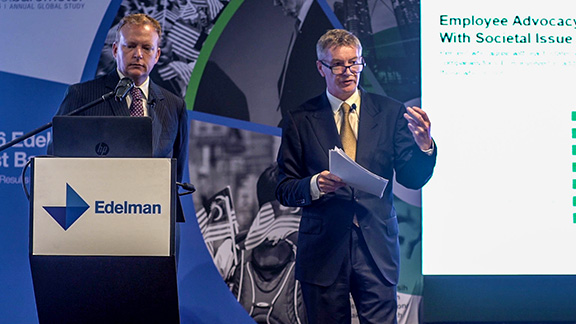Malaysians Are Losing Trust but Social Purpose and Transparency Can Reverse the Trend
Malaysians Are Losing Trust but Social Purpose and Transparency Can Reverse the Trend

Trust in business, media and government is falling as ordinary Malaysians grow weary of scandals and how they have been handled. That’s the bad news from the Edelman Trust Barometer 2016. The good news is that it can be fixed – if chief executives and senior officials step up with more transparency and greater commitment to tackling broader social challenges.
Trust is not an abstract concept or an afterthought. It is directly linked to how people behave, the annual survey by Edelman clearly shows. Your credibility determines whether people consume your products, services and message or choose an alternative. In the all-important realm of social media, trust determines whether they will recommend and defend you or be your harshest critics.
Malaysians expect business to take the lead on social challenges and to do much more to discuss public policy and issues such as income inequality.
The survey shows Malaysians see no conflict between doing well and doing good – with 85 percent agreeing that companies can act to raise profits while also improving economic and social conditions. But six in 10 people from the general population believe chief executives put too much emphasis on short-term financial results at the expense of job creation and long-term benefits.
Globally, the survey shows trust in business bouncing back among the general population with a five- point rise to 53 percent, reversing the five-point drop from the previous year. But Malaysia headed the other way, with the general population’s trust in business sliding two points to 58 percent. Trust in business among the informed public, who tend to have higher levels of education and pay, was steady at 67 percent.
Business remains the second most trusted of the four institutions in Malaysia and the most trusted to keep pace with the changing times. But the survey results prove that this is no time for complacency. The personal values of chief executives are seen as an important factor in building trust, as are the obstacles they have overcome, their personal success stories and how their education helped them.
Even though the CEO’s values and actions are critical in establishing credibility, the role of friends and family cannot be neglected. The latest survey shows a significant six-point jump in trust of peers or “a person like me” as credible spokespeople, eclipsing CEOs for the first time and reflecting the way people in Malaysia increasingly share and weigh information and opinions online.
Government credibility took a big hit after significant issues around alleged corruption and freedom of expression, along with the real and perceived lack of transparency and widespread allegations of mismanagement at state-linked companies.
Trust in government fell seven points to 39 percent among the general population and 11 points to 34 percent among the informed public – pointing to a major challenge for those in the corridors of power.
With its recent public discussion about Malaysia’s role in the Trans-Pacific Partnership, the government has made a concerted effort to ensure that terms of the 12-country trade agreement are understood by the general population, perhaps learning lessons from the implementation of the goods and services tax
in April 2015. These initiatives around the trade pact appear to have won positive feedback as the government looks to restore trust and credibility where it can.
One anomaly in the Malaysian data was the divergence in trust in media – with a one-point fall to 45 percent among the general population but a 13-point rise to 59 percent among the informed public.
Malaysia had one of the biggest rises in media trust among the informed public globally, possibly due to the constant coverage of alleged corruption at 1MDB. Extensively investigated by online outlets, the coverage led to the temporary closure of two media platforms. In speaking out against the government, specifically Prime Minister Najib Razak, hybrid media and high-profile media figures risked prosecution.
While this may have created a halo effect for the media landscape generally, trust in traditional media fell eight points to 49 percent, highlighting the need for more rigorous, balanced and transparent reporting to regain credibility.
Malaysians are also less trusting of content shared on social media, with a seven-point drop to 42 percent that could be the result of rampant sharing of misinformation online in the past year. As doubts about traditional and social media rise, search engines held their lead as the most trusted source for information at 66 percent – largely because people have more control over what they read and see.
Non-governmental organizations (NGOs) were the standouts in the latest Edelman survey, posting a rise among the informed public and the general population to regain their position as the most trusted of the four institutions.
The strong showing underscores the public’s belief that NGOs can influence policies for the betterment of the country and the people. Malaysia’s other three institutions – business, media and government – could earn more trust and credibility by paying attention and learning a lesson.
Robert Kay is the Managing Director in Malaysia for Edelman, a global public relations and communications marketing company. The latest edition of the Edelman Trust Barometer surveyed more than 33,000 people in 28 countries.



